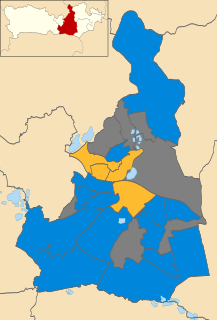The 2001 Wokingham District Council election took place on 7 June 2001 to elect members of Wokingham Unitary Council in Berkshire, England. One third of the council was up for election and the council stayed under no overall control. [1]
A unitary authority is a type of local authority that has a single tier and is responsible for all local government functions within its area or performs additional functions which elsewhere in the relevant country are usually performed by national government or a higher level of sub-national government.

Berkshire is one of the home counties in England. It was recognised by the Queen as the Royal County of Berkshire in 1957 because of the presence of Windsor Castle, and letters patent were issued in 1974. Berkshire is a county of historic origin, a ceremonial county and a non-metropolitan county without a county council. The county town is Reading.
In the context of local authorities in the United Kingdom, the term no overall control refers to a situation in which no single political group achieves a majority of seats; and is analogous to a hung parliament. Of the 310 councils who had members up for election in the 2007 local elections, 85 resulted in a NOC administration.
Contents
The previous election in 2000 saw both the Conservatives and Liberal Democrats win 27 seats. [2] The Liberal Democrats took control of the administration 2 months later after one of the Conservative councillors, Nigel Rose, abstained enabling the Liberal Democrats to get the mayor's casting vote. [2]

The Conservative Party, officially the Conservative and Unionist Party, is a centre-right political party in the United Kingdom. The governing party since 2010, it is the largest in the House of Commons, with 313 Members of Parliament, and also has 249 members of the House of Lords, 18 members of the European Parliament, 31 Members of the Scottish Parliament, 12 members of the Welsh Assembly, eight members of the London Assembly and 8,916 local councillors.

The Liberal Democrats are a centrist, liberal political party in the United Kingdom. It is currently led by Vince Cable. It has 11 Members of Parliament in the House of Commons, 96 members of the House of Lords, one member of the European Parliament, five Members of the Scottish Parliament and one member in the Welsh Assembly and London Assembly. At the height of its influence, the party served as junior partners in a coalition government with the Conservative Party from 2010 to 2015.
A Councillor is a member of a local government council.
The results of the 2001 election saw no change with both main parties remaining on the same number of seats. [3] Overall turnout was significantly increased at 63.75% due to the election being held at the same time as the 2001 general election. [3]

Voter turnout is the percentage of eligible voters who cast a ballot in an election. Eligibility varies by country, and the voting-eligible population should not be confused with the total adult population. Age and citizenship status are often among the criteria used to determine eligibility, but some countries further restrict eligibility based on sex, race, or religion.
After the election, the composition of the council was
- Conservative 27
- Liberal Democrat 27 [4]








